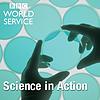
Science In Action
BBC World Service
Categories: Science & Medicine
Listen to the last episode:
The near extinction of vultures in India may be responsible for an additional half a million human deaths between 2000 and 2005. The widespread use of the painkiller diclofenac in herds of cattle, starting in 1994, led to a massive decline in vulture populations in India, as the drug is poisonous to them. We hear from environmental economist Anant Sudarshan of Warwick University.
Cooking like a Neanderthal - Mariana Nabais of the Catalan Institute of Human Paleoecology and Social Evolution has been replicating ancient butchering methods to learn how Neanderthals ate birds.
A faster test for sepsis – we hear from Sunghoon Kwon of Seoul National University about a new method for identifying the pathogens involved in sepsis cases. The test has the potential to reduce the turnaround times normally associated with developing treatments for infections and may improve patient outcomes.
And it seems we may have inherited some conversational habits from chimps – or rather from whatever came before us and chimps 6 million years ago. Cat Hobaiter of the School of Psychology and Neuroscience of St Andrews University and her colleagues have found that like humans, wild chimps engage in snappy, turn-taking conversations.
Presenter: Roland Pease Producer: Jonathan Blackwell Production Coordinator: Jana Bennett-Holesworth
(Image: World Wildlife Day - Gyps fulvus feeding on a buffalo carcass at Kaziranga National Park in Assam, India. Credit: Anuwar Hazarika/NurPhoto via Getty Images)
Previous episodes
-
463 - The human cost of the decline of nature’s carcass cleanersThu, 25 Jul 2024
-
462 - Destination Asteroid ApophisThu, 18 Jul 2024
-
461 - Hurricane Beryl’s trail of destructionThu, 11 Jul 2024
-
460 - Cleaner mining, cleaner batteriesThu, 04 Jul 2024
-
459 - On the road to halting HIVThu, 27 Jun 2024
-
458 - China: Scientific superpowerThu, 20 Jun 2024
-
457 - US bird flu response warningThu, 13 Jun 2024
-
456 - A humungous temporary tentacleThu, 06 Jun 2024
-
455 - Trusting AI with scienceThu, 30 May 2024
-
454 - The roots of fentanyl addictionThu, 23 May 2024
-
453 - Aurora Bore-WOW-lisThu, 16 May 2024
-
452 - Changing blood types and whale grammarThu, 09 May 2024
-
451 - Crossover infectionsThu, 02 May 2024
-
450 - An armada for asteroid Apophis?Thu, 25 Apr 2024
-
449 - Unexpected black hole in our galaxyThu, 18 Apr 2024
-
448 - Bird flu in AntarcticaThu, 11 Apr 2024
-
447 - Earthquake in TaiwanThu, 04 Apr 2024
-
446 - Star for a dayThu, 28 Mar 2024
-
445 - Out of AfricaThu, 21 Mar 2024
-
444 - Impacts of global warmingThu, 14 Mar 2024
-
443 - The first stars in the universeThu, 07 Mar 2024
-
442 - One million genomes in two dimensionsThu, 29 Feb 2024
-
441 - Largest ever covid safety studyThu, 22 Feb 2024
-
440 - Climate scientist wins defamation caseThu, 15 Feb 2024
-
439 - Particle physics v climate changeThu, 08 Feb 2024
-
438 - Unethical data gathering in ChinaThu, 01 Feb 2024
-
437 - Drilling into the pastThu, 25 Jan 2024
-
436 - Swine fever in South East AsiaThu, 18 Jan 2024
-
435 - Seeking supernovasThu, 11 Jan 2024
-
434 - Tackling tuberculosis in South AfricaThu, 04 Jan 2024
-
433 - Following in the footsteps of ancient humansThu, 28 Dec 2023
-
432 - Volcanic eruption lights up IcelandThu, 21 Dec 2023
-
431 - The science of morning sicknessThu, 14 Dec 2023
-
430 - Can carbon capture live up to its hype?Thu, 07 Dec 2023
-
429 - All aboard the RRS Sir David AttenboroughThu, 30 Nov 2023
-
428 - Fires in the Pantanal wetlandsThu, 23 Nov 2023
-
427 - Volcanic rumblings in IcelandThu, 16 Nov 2023
-
426 - Sounds of the CapeThu, 09 Nov 2023
-
425 - Climate emergencyThu, 02 Nov 2023
-
424 - Bird flu reaches Antarctic regionThu, 26 Oct 2023
-
423 - Alarm at Campi Flegrei, ItalyThu, 19 Oct 2023
-
422 - Devastating earthquakes hit AfghanistanThu, 12 Oct 2023
-
421 - The best and the worstThu, 05 Oct 2023
-
420 - Trilobite dinnerThu, 28 Sep 2023
-
419 - More likely, more intenseThu, 21 Sep 2023
-
418 - Deadly floods in DernaThu, 14 Sep 2023
-
417 - Returning to the North PoleThu, 07 Sep 2023
-
416 - Drowning coastal ecosystemsThu, 31 Aug 2023
-
415 - Brain-computer interfacesThu, 24 Aug 2023
-
414 - The science behind the Hawaii fireThu, 17 Aug 2023























